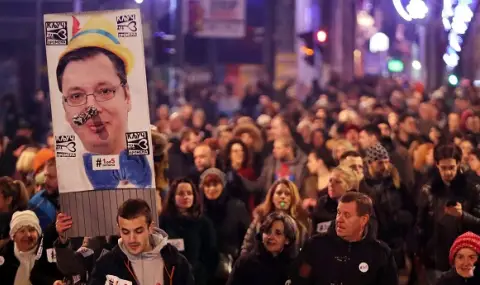Recently, we seem to have gotten used to perceiving news about protests in various European countries as a political clash and even as pieces of the puzzle of geopolitical confrontation. In Slovakia, protesters accuse Prime Minister Robert Fico of pushing the country into the Russian orbit. In Georgia, the authorities have been under prolonged siege due to the suspension of EU membership negotiations. In Germany, they recently protested against (the rise of) the "far right" in the face of the "Alternative for Germany". In Romania, a protest was held against the cancellation of the first round of the presidential election. In Croatia, citizens boycotted shops and retail chains in protest against price increases (similar actions are being prepared for January 31 in Bosnia and Herzegovina, North Macedonia and Montenegro), which is also a reaction against government policy (or lack thereof regarding inflation).
However, things are different in Serbia. The demonstrations began because of an incident with human casualties (15 people died as a result of the collapse of the canopy at the Novi Sad train station) and have been continuing stubbornly for almost 3 months. However, these protests are not political in the classical sense of the word (opposition to the ruling party), but rather civil - for the authorities to take responsibility for the tragedy and for the whole truth, probably hidden due to corruption schemes, to be revealed. This is proven by the main demands of the protesters, namely:
Providing full information about the renovation of the railway station carried out months before the incident.
Dropping the charges against those detained during the protest actions.
Identifying the attackers of the protesters and bringing them to justice.
Increasing the budget for higher education.
In practice, 2 and 3 are a secondary effect of the growth and escalation of the protests, and 4 is due to the fact that the students have a leading role in the protest actions, although they are far from the only participants. As they say, now they have also had to put forward a conditional demand - a 20% increase in the budget funding of state universities. Which has even been accepted.
The most important demand remains - for justice.
Political were the protests in Serbia 25 years ago, which brought down Slobodan Milosevic. At that time, the opposition accused the ruling party of rigging the presidential elections - which was later confirmed by the Constitutional Court. The protests were again massive, but were led by the united political opposition and its leaders, one of whom, Vojislav Kostunica, became president, and another, Zoran Djindjic, prime minister. While now the weak and divided opposition is practically not "reflected" by the protesters.
Yes, President Aleksandar Vucic claims that "foreign forces coming from several Western countries" are behind the protests. But in reality, such energy and mass participation cannot be "brought" from outside. At most, various foreign agents are trying to interfere in the organization of the protest actions (with similar arguments, the Serbian state expelled five Croatian citizens), but to believe that external forces are at the root is frivolous. Just as frivolous as the nonsense about the Bulgarian protests of January 1997 - that we jumped for 50 German marks a day, and that there were drugs in the tea that was given to us by the social service of the Sofia Municipality. I say this as an active participant in those events.
The thesis that the Serbian protests were organized by the West (push- ed not only by Vučić, but also by his Belarusian counterpart Alexander Lukashenko) also hangs on another line. Geopolitically, Vučić's Serbia is not entirely in the Russian-Chinese camp, but is trying to be the successor to Tito's Yugoslavia in international relations - a kind of "bridge" between East and West. Belgrade does not support European sanctions against Moscow, but in return provides weapons to Kiev. Last year, Serbia signed a deal with France to purchase French "Rafale" fighter jets. And, at the same time, our western neighbor is a conduit for Chinese economic (and therefore geopolitical) interests in Europe. The latter turned out to be the spark that ignited the protests - the renovation of the Novi Sad railway station was carried out by a Chinese company.
Vučić's charlatanry to "play" with everyone and leave his doors open everywhere may not be liked in Western capitals, but it does not mean that they will "muddle the waters" and in response, he will turn more categorically in the opposite direction. Rather, suggestions of Western intervention will be for local consumption.
Even the majority of protesters have little objection to their country seeking to extract benefits from everywhere. But they certainly have a lot against these attempts being at the expense of human lives.
Although non-political, the protests in Serbia have caused a political crisis. Prime Minister Miloš Vučević has resigned, and if a new government is not formed within a month, the country will go to elections.
This is also true in socio-political life. In some cases, targeted efforts at destabilization (including those stimulated from outside) hit a brick wall, while in others, destabilization occurs naturally.
As for President Vučić, he is certainly aware of the risks facing him, since a quarter of a century ago, students played a key role in the overthrow of Milošević. And for now, he is "cutting the lizard's tail" so as not to focus the protest anger on himself.
And for their part, the protesters must already be aware of the risks posed by Chinese economic penetration. And here we are not (only) talking about economic dependence. And for low standards, which is a reflection of the low value of human life.
The Serbian protests have been going on for 3 months now. But no matter how they end, they will remain "outside the mold".
